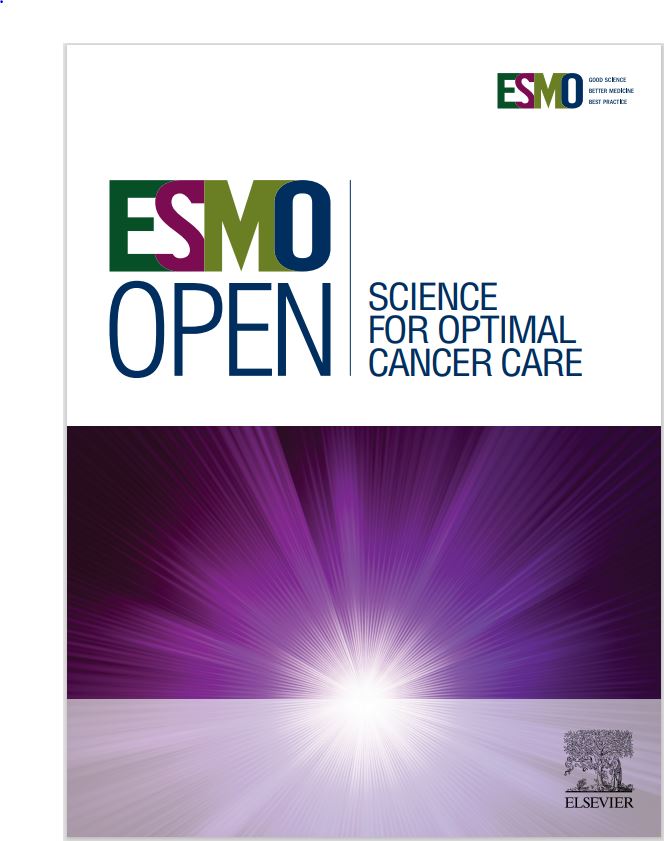First-in-human study of FAZ053, an anti-programmed death-ligand 1 (anti-PD-L1) monoclonal antibody, alone and in combination with spartalizumab, in patients with advanced malignancies
IF 7.1
2区 医学
Q1 ONCOLOGY
引用次数: 0
Abstract
Background
FAZ053 triggers an antitumor response by targeting programmed death-ligand 1 (PD-L1), thereby activating effector T cells and negatively regulating T cells. This study assessed the safety, tolerability, and preliminary efficacy of FAZ053 monotherapy and in combination with spartalizumab in patients with advanced solid tumors.
Methods
This phase I, multicenter, open-label study (NCT02936102) included dose escalation and dose expansion. The primary objectives were safety and tolerability; secondary objectives were pharmacokinetics, pharmacodynamics, and preliminary antitumor activity.
Results
Of the 154 patients treated, 49 (52.7%) patients receiving FAZ053 monotherapy experienced at least one treatment-related adverse event (TRAE), of whom 6 (6.5%) experienced grade ≥3 TRAEs; 35 patients (57.4%) receiving combination therapy experienced TRAEs, of whom 3 (4.9%) experienced grade ≥3 TRAEs. One patient who received FAZ053 1600 mg every 6 weeks (Q6W) and one who received FAZ053 20 mg every 3 weeks (Q3W) with spartalizumab 300 mg Q3W experienced dose-limiting toxicities of grade 4 creatinine increase and grade 3 liver function test increased, respectively. The median duration of exposure was 105 days for monotherapy and 85 days for combination therapy. During dose escalation, response was observed in 3 (5.1%) and 3 (4.9%) patients receiving FAZ053 monotherapy and combination therapy, respectively. In dose expansion, response was observed in 2 (50%) patients with advanced alveolar soft part sarcoma (ASPS) and 3 (30%) patients with advanced chordoma receiving FAZ053 monotherapy. FAZ053 demonstrated a dose-proportional pharmacokinetic profile with a terminal half-life of 20.6 days at 1200 mg Q3W. Biomarker analysis showed increased immune gene expression following FAZ053 treatment. The recommended dose for expansion was 1200 mg Q3W.
Conclusion
FAZ053 monotherapy was well tolerated and effective in maintaining disease control in various tumors including ASPS and chordoma. The anticipated synergistic effect of combined programmed cell death protein 1 (PD-1) and PD-L1 inhibition was not observed. These findings contribute to the growing evidence that rare, phenotypically ‘immune cold’ sarcomas, such as ASPS and chordoma, can become responsive to immune checkpoint inhibitors.
FAZ053是一种抗程序性死亡配体1(抗pd - l1)单克隆抗体,在晚期恶性肿瘤患者中单独或与斯巴达单抗联合进行的首次人体研究
faz053通过靶向程序性死亡配体1 (PD-L1)触发抗肿瘤反应,从而激活效应T细胞并负调控T细胞。本研究评估了FAZ053单药治疗和联合斯巴达单抗治疗晚期实体瘤患者的安全性、耐受性和初步疗效。方法该I期多中心开放标签研究(NCT02936102)包括剂量递增和剂量扩展。主要目标是安全性和耐受性;次要目标是药代动力学、药效学和初步抗肿瘤活性。结果154例患者中,49例(52.7%)接受FAZ053单药治疗的患者出现至少一次治疗相关不良事件(TRAE),其中6例(6.5%)出现≥3级TRAE;接受联合治疗的患者有35例(57.4%)出现trae,其中3例(4.9%)出现≥3级trae。1例患者每6周接受FAZ053 1600 mg (Q6W), 1例患者每3周接受FAZ053 20 mg (Q3W),同时接受斯巴达单抗300 mg Q3W,分别出现4级肌酐升高和3级肝功能试验增加的剂量限制性毒性。单药治疗的中位暴露时间为105天,联合治疗的中位暴露时间为85天。在剂量递增期间,分别有3例(5.1%)和3例(4.9%)患者接受FAZ053单药治疗和联合治疗。在剂量扩大方面,接受FAZ053单药治疗的2例(50%)晚期肺泡软组织肉瘤(ASPS)患者和3例(30%)晚期脊索瘤患者均有疗效。FAZ053表现出剂量比例药代动力学特征,在1200mg Q3W时终末半衰期为20.6天。生物标志物分析显示FAZ053治疗后免疫基因表达增加。推荐膨胀剂量为1200mg Q3W。结论faz053单药治疗ASPS、脊索瘤等多种肿瘤具有良好的耐受性和良好的疾病控制效果。未观察到程序性细胞死亡蛋白1 (PD-1)和PD-L1联合抑制的预期协同效应。这些发现提供了越来越多的证据,证明罕见的、表型上的“免疫冷”肉瘤,如ASPS和脊索瘤,可以对免疫检查点抑制剂产生反应。
本文章由计算机程序翻译,如有差异,请以英文原文为准。
求助全文
约1分钟内获得全文
求助全文
来源期刊

ESMO Open
Medicine-Oncology
CiteScore
11.70
自引率
2.70%
发文量
255
审稿时长
10 weeks
期刊介绍:
ESMO Open is the online-only, open access journal of the European Society for Medical Oncology (ESMO). It is a peer-reviewed publication dedicated to sharing high-quality medical research and educational materials from various fields of oncology. The journal specifically focuses on showcasing innovative clinical and translational cancer research.
ESMO Open aims to publish a wide range of research articles covering all aspects of oncology, including experimental studies, translational research, diagnostic advancements, and therapeutic approaches. The content of the journal includes original research articles, insightful reviews, thought-provoking editorials, and correspondence. Moreover, the journal warmly welcomes the submission of phase I trials and meta-analyses. It also showcases reviews from significant ESMO conferences and meetings, as well as publishes important position statements on behalf of ESMO.
Overall, ESMO Open offers a platform for scientists, clinicians, and researchers in the field of oncology to share their valuable insights and contribute to advancing the understanding and treatment of cancer. The journal serves as a source of up-to-date information and fosters collaboration within the oncology community.
 求助内容:
求助内容: 应助结果提醒方式:
应助结果提醒方式:


